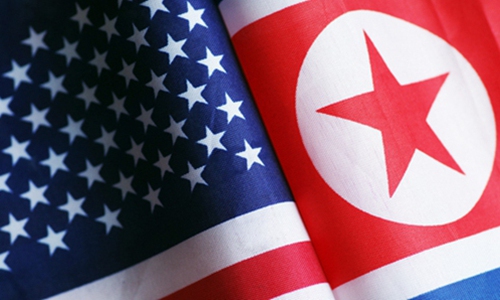HOME >> OPINION
Where will US-North Korea relations head in 2020?
By Cheng Xiaohe Source:Global Times Published: 2020/1/5 21:32:58

Photo: IC
The US-North Korean drama ushers in a new episode. The long-awaited year-end deadline, announced by North Korean leader Kim Jong-un, passed, the US dropped the first shoe by defying North Korea's warnings and making no concessionary move anticipated by Pyongyang.
On the first day of 2020, North Korea dropped the second shoe by announcing a new path leading to a renewed confrontation. It is clear that North Korea will not be bound by its self-imposed moratorium on nuclear and missile tests and unveil new strategic weapon in the near future.
If North Korea turns its words into action, we may witness a resumption of tensions on the Korean Peninsula, and US-North Korea relations may run into choppy waters after enjoying a nearly not-too-short rapprochement.
In the past two years, US Secretary of State Mike Pompeo has made four trips to Pyongyang, officials from both countries have held several rounds of negotiations and US President Donald Trump and Kim have met three times in high-profile meetings.
Amid the flurry of diplomatic activities, relations between Washington and Pyongyang should have been on the right track. Unfortunately, the past intensive diplomatic interactions between the two countries produced more disappointment and frustration.
The deadline, which was partially designed to disrupt the stonewalling tactics adopted by the Trump administration in the previous negotiations with North Korea, was snubbed by the Trump administration. In his speech to the fifth Plenary Meeting of the seventh Party Congress, Kim did not hide his disappointment, accusing the US of seeking "its own political and diplomatic interests while wasting time away under the signboard of dialogue and negotiations" and remaining "unchanged in its ambition to stifle" North Korea. Kim vowed to launch offensive for frontal breakthrough in North Korea's relations with the US.
Kim's speech clearly revealed that North Korea has changed its position on the nuclear and missile issues and places national security above economic development. Some analysts predicted that North Korea has abandoned its newly adopted strategy to concentrate on economic development and is retreating to the old two-tracked strategy, namely, simultaneously developing economy and nuclear weapons.
It may not be the case. Even though North Korea insisted that it will have nothing to lose as it resumes strategic weapon tests, it may not return to the old days in which it could conduct full-blown nuclear and missile tests at will. Any new nuclear or ICBM tests may invite new sanctions from the UN Security Council, risking diplomatic achievements the country has achieved in the past two years.
I tend to believe the changes reflect North Korea's deep-seated belief that it was too passive and weak to force the Trump administration to make a change on nuclear and sanctions issues. North Korea already has a nuclear deterrent and does not need to build a new strategic weapon for survival at a high cost. Thus, resorting to strategic weapons development is more like a tactics than a strategic rollback. The aim is to create tension to force a change on the part of the US.
Nonetheless, as Kim set the tone for a change, it is only a matter of time before the North Korean government turns its words into action. The timing of effectuating the policy change is crucial. Pyongyang can acquire a new strategic weapon quickly in order to deliver on the top leader's promise or keep the promise pending in order to leave some time for North Korea and the US to work out their differences.
So far, the US responses have been moderate. Trump continued to insist that Kim "likes me" and Kim "is a man of his word." No doubt, if North Korea presses ahead with its ICBM or nuclear tests, the Trump administration will definitely take up the issue with the UN Security Council in an effort to seek additional sanctions, and at the same time, the US and South Korea may also restore their scaled-down joint military exercises, as Secretary of Defense Mark Esper threatened. The US-North Korea relations thus will come under serious test.
The good news is that both North Korea and the US have not ruled out political settlement of their disputes over denuclearization and sanctions and their disputes are not about if denuclearization could lift sanctions but about which country moves first and how far each country can go in denuclearization and sanctions-lifting, respectively, and how fast the deal can be inked.
This year sees a presidential election in the US. President Trump, who is facing impeachment, will not turn improved Washington-Pyongyang relations into a liability. If North Korea can offer him something good enough to present American voters with a significant diplomatic achievement, Trump may reciprocate in kind to cash in on his two-year diplomatic engagement with North Korea to boost his chance of winning the election. If the US and North Korea can break the nuclear deadlock, other connected issues will be settled quickly.
Bearing all the possibilities in mind, it is too early to predict that US-North Korea relations are doomed this year.
The author is an associate professor with the School of International Studies, Renmin University of China and a senior researcher with the Pangoal Institute. opinion@globaltimes.com.cn
Posted in: VIEWPOINT